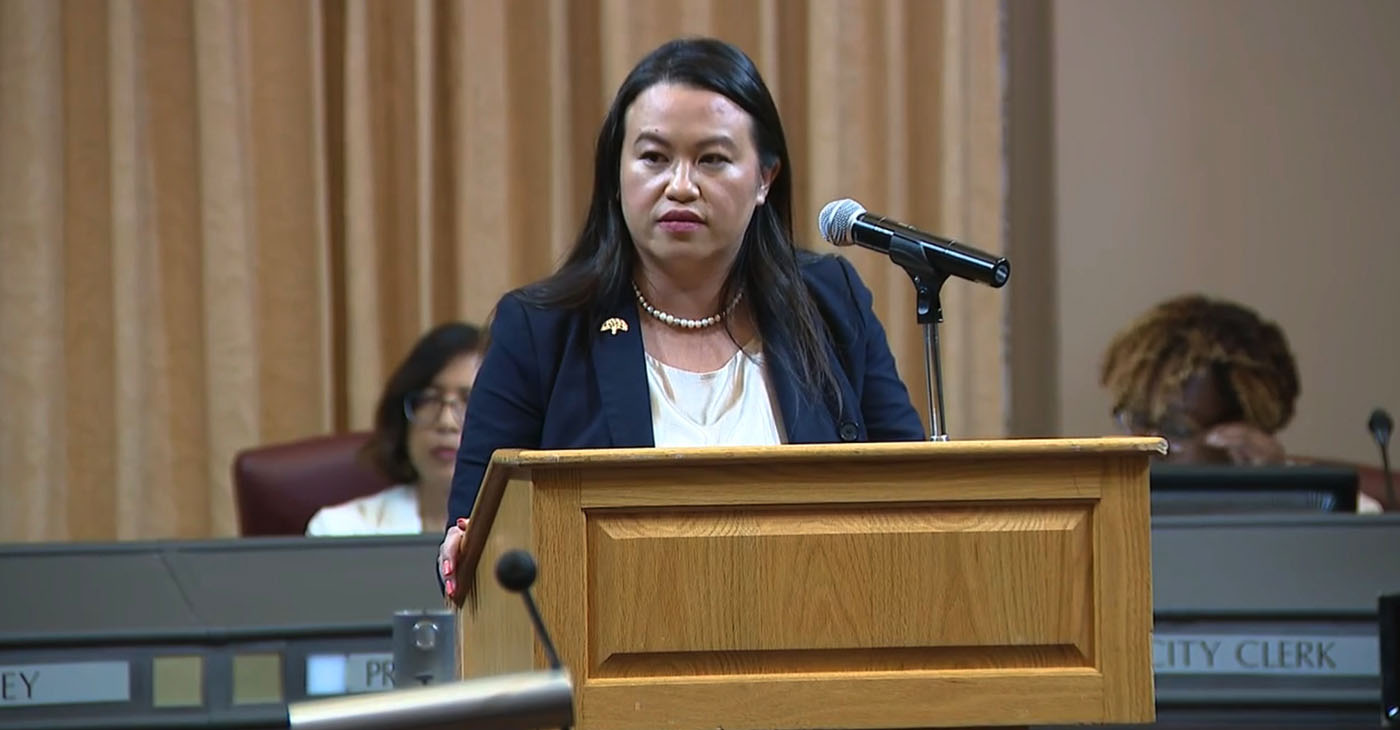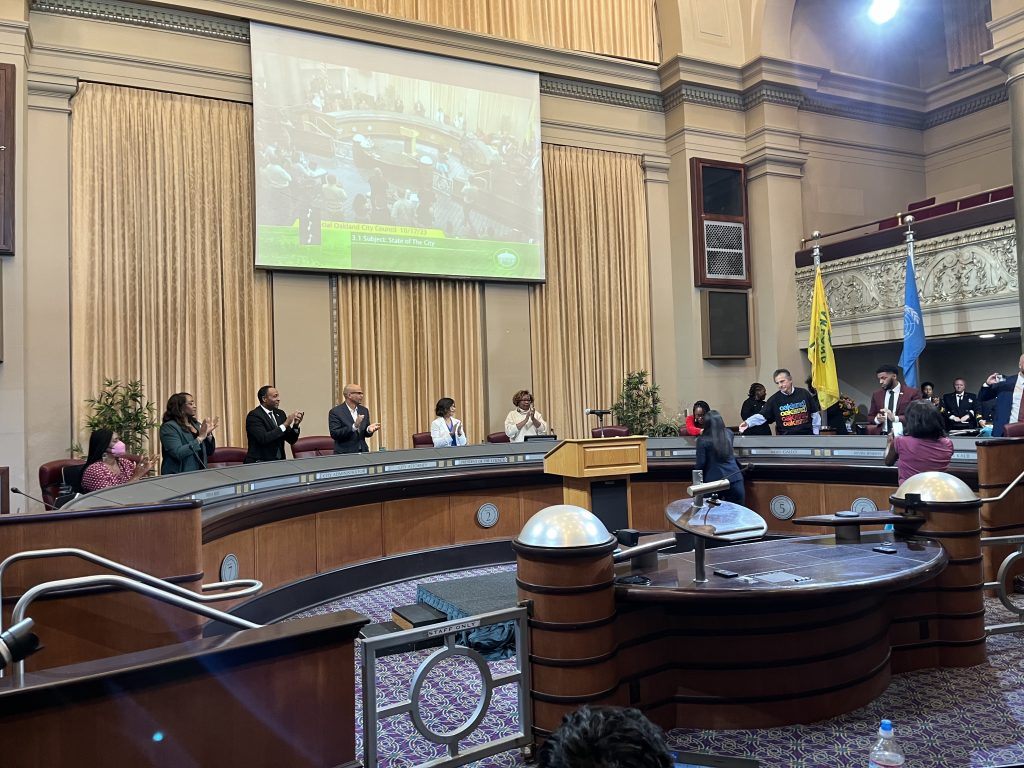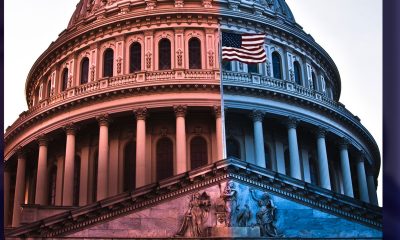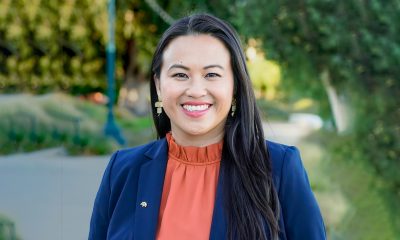Activism
Oakland Mayor Lays Out Agenda for Community Safety in State of the City Address

By Magaly Muñoz, Post Staff
At a special City Council meeting in City Hall Tuesday afternoon, Oakland Mayor Sheng Thao laid out her current and future plans for community safety.
For some time, public safety has been a major issue in Oakland. City leaders and business owners have been critical of the city’s lack of initiative in responding to their concerns.
Thao reflected on the initiatives she has implemented during her first ten months in office. She mentioned the increased investment in the Mobile Assistance Community Responders (MACRO) program, which sends trained mental health professionals to non-violent mental health and non-criminal situations.
She also highlighted the additional funding for six new police academies and the expansion of foot patrol police throughout the city.

Mayor Sheng Thao several initiatives that include more community policing. Photo by Magaly Muñoz.
Her new efforts are to enhance 911 police dispatching, add 300 new license plate readers, and put community ambassadors, security personnel, security cameras, and other additional infrastructure in high-traffic areas of the city.
Thao said she’s been listening to the community’s concerns and understands that things like violence prevention and community safety contribute to the overall improvement of the city.
“I know we have work to do, but we can only do it if we all come together,” Thao said.
The mayor also committed to investing in homelessness and housing issues in Oakland and to collaborate with as many officials and communities as possible to combat the housing crisis.
According to a 2023 article by Business Insider, Oakland ranks among the largest cities in California with the highest cost of living, with rent averaging about $2,700 per month and four-bedroom homes priced at approximately $900,000.
One of Thao’s initiatives involves collaborating with other Bay Area mayors to place a housing measure on the November 2024 ballot to expand the construction of affordable housing throughout the region.
The plan also includes $200 million for creating affordable housing units over the next two years, $53 million in state grant funding to construct 1,000 new affordable housing units, and preservation of 134 affordable units through Oaklands’s Acquisition and Conversion to Affordable Housing program.
As businesses struggle to stay open, Thao affirmed that she’s committed to revitalizing the city’s tourism. She has partnered with Visit Oakland and Activate Oakland to reinvest in the commercial areas to promote economic recovery from the effects of the pandemic.
This plan includes launching “Five after Five,” a pilot program to allow parking in the 19th Street Garage from 5:00 p.m. to 3:00 a.m. for only $5, Thursday through Saturday, to bolster Oakland’s nightlife, concert venues, and weekend shopping.
“All of these investments we’re making in Oakland are contributing to making more businesses stick here in Oakland, more businesses expanding in Oakland, and more businesses coming to Oakland,” Thao said.
Thao took responsibility for missing out on the Organized Retail Theft Prevention Grant, stating, “I own that, the buck stops with me.” She declared that she is fast-tracking the recruitment of a grants coordinator and bringing in more grant management expertise. Additionally, she announced plans to upgrade and modernize the city’s grant management software tools.
Thao concluded her address by saying she’s “up for the challenge” to make Oakland a better place to live. Her final words were, “Let’s unite for Oakland. Let’s fight for Oakland. This is our city. This is our fight, and this is our future. Thank you all so much for joining me.”
Despite the extensive commitments Thao made in the agenda to ensure Oakland’s safety and success, people questioned her absence during the public comment, bypassing the opportunity to hear community feedback.
“You need to be here to listen; you gotta listen to what we’re saying,” Edwin Escobar said. “Hear us because we need you to do your job. People are dying; businesses are closing. This is real; the struggle is real.”
Councilmember Nikki Fortunato Bas said that the city officials have been working and will continue to work to give the community the basics, making sure that everyone from kids to seniors feel safe and that businesses feel like they have a place to thrive.
“We have to do better because we all deserve a stronger and safer, more united Oakland,” Bas said.
Activism
Oakland Post: Week of June 4 – 10, 2025
The printed Weekly Edition of the Oakland Post: Week of June 4-10, 2025

To enlarge your view of this issue, use the slider, magnifying glass icon or full page icon in the lower right corner of the browser window.
Activism
Remembering George Floyd
BLACKPRESSUSA NEWSWIRE — Minnesota State Attorney General Keith Ellison acknowledges that the Floyd case five years ago involved a situation in which due process was denied, and five years later, the president is currently dismissing “due process. “The Minnesota Atty General also says, “Trump is trying to attack constitutional rule, attacking congressional authority and judicial decision-making.” George Floyd was an African American man killed by police who knocked on his neck and on his back, preventing him from breathing.

By April Ryan
BlackPressUSA Newswire
“The president’s been very clear he has no intentions of pardoning Derek Chauvin, and it’s not a request that we’re looking at,” confirms a senior staffer at the Trump White House. That White House response results from public hope, including from a close Trump ally, Georgia Congresswoman Marjorie Taylor Greene. The timing of Greene’s hopes coincides with the Justice Department’s recent decision to end oversight of local police accused of abuse. It also falls on the fifth anniversary of the police-involved death of George Floyd on May 25th. The death sparked national and worldwide outrage and became a transitional moment politically and culturally, although the outcry for laws on police accountability failed.
The death forced then-Democratic presidential candidate Joe Biden to focus on deadly police force and accountability. His efforts while president to pass the George Floyd Justice in policing act failed. The death of George Floyd also put a spotlight on the Black community, forcing then-candidate Biden to choose a Black woman running mate. Kamala Harris ultimately became vice president of the United States alongside Joe Biden. Minnesota State Attorney General Keith Ellison prosecuted the cases against the officers involved in the death of Floyd. He remembers,” Trump was in office when George Floyd was killed, and I would blame Trump for creating a negative environment for police-community relations. Remember, it was him who said when the looting starts, the shooting starts, it was him who got rid of all the consent decrees that were in place by the Obama administration.”
In 2025, Police-involved civilian deaths are up by “about 100 to about 11 hundred,” according to Ellison. Ellison acknowledges that the Floyd case five years ago involved a situation in which due process was denied, and five years later, the president is currently dismissing “due process. “The Minnesota Atty General also says, “Trump is trying to attack constitutional rule, attacking congressional authority and judicial decision-making.” George Floyd was an African-American man killed by police who knocked on his neck and on his back, preventing him from breathing. During those minutes on the ground, Floyd cried out for his late mother several times. Police subdued Floyd for an alleged counterfeit $20 bill.
Activism
Oakland Post: Week of May 28 – June 30, 2025
The printed Weekly Edition of the Oakland Post: Week of May 28 – June 3, 2025

To enlarge your view of this issue, use the slider, magnifying glass icon or full page icon in the lower right corner of the browser window.
-

 Activism4 weeks ago
Activism4 weeks agoAfter Two Decades, Oakland Unified Will Finally Regain Local Control
-

 Activism4 weeks ago
Activism4 weeks agoOakland Post: Week of May 14 – 20, 2025
-

 Alameda County4 weeks ago
Alameda County4 weeks agoOakland Begins Month-Long Closure on Largest Homeless Encampment
-

 Activism4 weeks ago
Activism4 weeks agoNew Oakland Moving Forward
-

 Barbara Lee4 weeks ago
Barbara Lee4 weeks agoWNBA’s Golden State Valkyries Kick Off Season with Community Programs in Oakland
-

 Activism4 weeks ago
Activism4 weeks agoEast Bay Community Foundation’s New Grants Give Oakland’s Small Businesses a Boost
-

 Bo Tefu4 weeks ago
Bo Tefu4 weeks agoGov. Newsom Highlights Record-Breaking Tourism Revenue, Warns of Economic Threats from Federal Policies
-

 Bay Area4 weeks ago
Bay Area4 weeks agoChevron Richmond Installs Baker Hughes Flare.IQ, Real-time Flare Monitoring, Control and Reduction System





















































